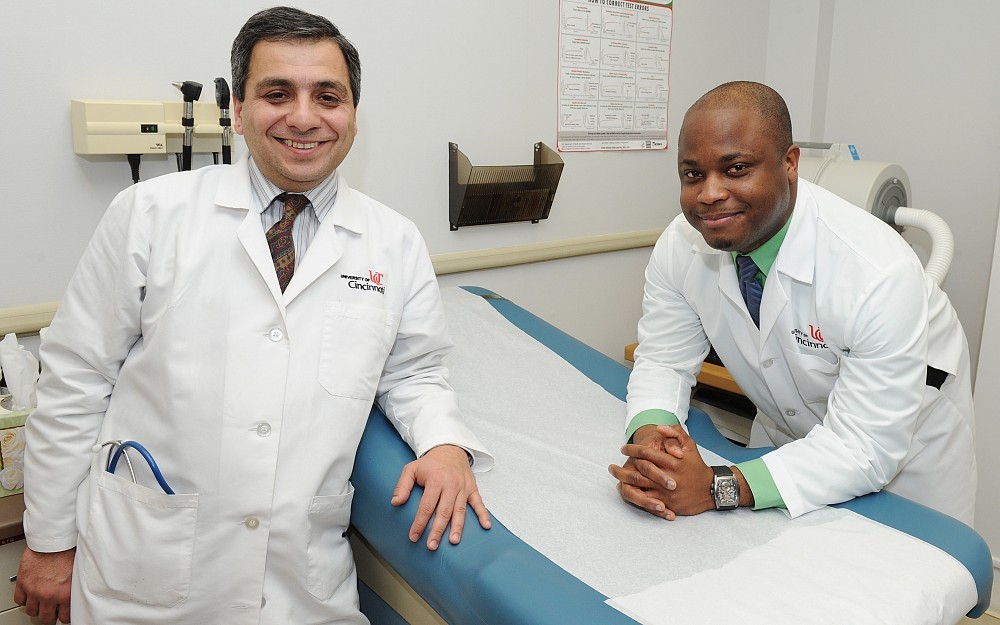
Master's of Public Health Program Adds Occupational Public Health Concentration
Working is a way of life for the majority of the population.
Unfortunately, sometimes what we do to make a living can take a toll on our healthboth physically and emotionally.
As part of the Masters of Public Health (MPH) Program, housed in the department of environmental health, experts at the UC College of Medicine are now educating future physicians on the best ways to both prevent injury and treat patients who have been hurt in their line of work through the occupational public health (OPH) concentration and the Occupational Medicine Residency Program.
Andrew Freeman, MD, MS, an assistant professor in the department of environmental health, is the director of the newest MPH Program concentration, which officially began Jan. 1, along with James Donovan, MD, MS, and James Lockey, MD, MS. He says this program has a preventive medicine focus but also teaches residents to take care of injured workers and to prevent disability.
"In occupational medicine, physicians must look at all aspects of the worker and his or her health to prevent injuries and illness on the job he says. "We devise programs to enhance safety and educate workers on best practices as well as to offer care if injury does occur. Additionally, we coordinate efforts to allow the patients successful return to the job.
Freeman says the universitys two-year Occupational Medicine Residency Program, the longest-running program of its kind in the nation, incorporates aspects of graduate school and a traditional residency. Trainees spend time in several different occupational medicine clinics and in classrooms learning about preventive medicine as well as the administrative side of occupational medicine, including general business training.
"The OPH concentration of the MPH program is a required part of the training for occupational medicine residents, but the concentration could also be a valuable option for students outside the residency program, Freeman says. "For example, the OPH concentration, with only one additional year of school, offers students in-depth training in both occupational health and public health. This training, along the MPH degree, will position its graduates well for jobs in both the occupational health field and other areas of the health care system.
"Completion of this concentration would provide medical students and physicians who already possess a medical degree with in-depth knowledge of the occupational medicine specialty. In addition, if they chose to continue down this path, they would be earning advanced credit toward completing the requirements of an occupational medicine residency.
Freeman says those with occupational health training can work in a number of settingsfrom corporate medicine to urgent care to government agencies and even private consultant groups.
Additionally, besides the expertise within the department, the OPH concentration of the MPH program and the Occupational Medicine residency program have a number of advantages because they are located in Cincinnati.
"The Education and Information Division and the Division of Surveillance, Hazard Evaluations and Field Studies of the National Institute for Occupational Safety and Health (NIOSH) are headquartered in Cincinnati, he says, adding that most NIOSH occupational health hazard evaluations and industry-wide studies are conducted by physicians based in Cincinnati.
"All of our residents rotate there, and we have a strong ongoing relationship with the institute. Cincinnati is also the headquarters of the American Conference of Governmental Industrial Hygienists Industrial hygienists are important occupational health partners in safeguarding worker health. There are a lot of opportunities for our trainees to make connections with Cincinnati-based experts in the occupational medicine and public health fields which will further enhance their careers following the completion of this training.
Bill Mase, DrPH, director of the MPH program, says the advantages that accompany this concentration are numerous and will help grow the reputation of an already successful program.
"We are very happy to have this concentration within our program, says Mase. "The strength of this track truly enhances the overall strength of our program and highlights the expertise of not only our trainees but also the educators within the department.
Occupational Public Health Concentration Description:
Students enrolled in the OPH concentration will complete a total of 45 semester hours, including 18 semester hours in the core MPH courses, a minimum of 19 hours of study in approved OPH concentration courses and a minimum of 8 semester hours in the practicum and capstone phase of the program. The OPH concentration prepares students to take or advance careers in Occupational Health. In the case of Occupational Medicine residents, completion of their MPH degree with an OPH concentration fulfills important requirements of the Accreditation Council for Graduate Medical Education (ACGME) as well as the American Board of Preventive Medicine (ABPM) as residents prepare for their board certification in Preventive Medicine with a specialty in Occupational Medicine. Graduates of the University of Cincinnati MPH program with an OPH concentration are appropriately trained to assume leadership positions in settings that include: government agencies, university occupational health positions, corporate medical departments, hospital-based occupational medicine departments, insurance companies and ambulatory occupational medicine practices.
Related Stories
Machine learning brings new insights to cell’s role in...
April 30, 2025
Researchers led by the University of Cincinnati’s Anna Kruyer and the University of Houston’s Demetrio Labate have published research in the journal Science Advances applying object recognition technology to track changes in brain cell structure and provide new insights into how the brain responds to heroin use, withdrawal and relapse.
Most teens prescribed SSRIs did not have recommended follow-up...
April 30, 2025
The University of Cincinnati and Cincinnati Children's Hospital Medical Center's Martine Lamy commented to Medscape on new research that found fewer than half of the adolescents prescribed a selective serotonin reuptake inhibitor (SSRI) at two large Chicago pediatric primary care clinics had a follow-up visit within the recommended 6 weeks.
UC recognizes students for innovation achievement and leadership
April 30, 2025
Read about the University of Cincinnati’s undergraduate innovation awards for 2025.
